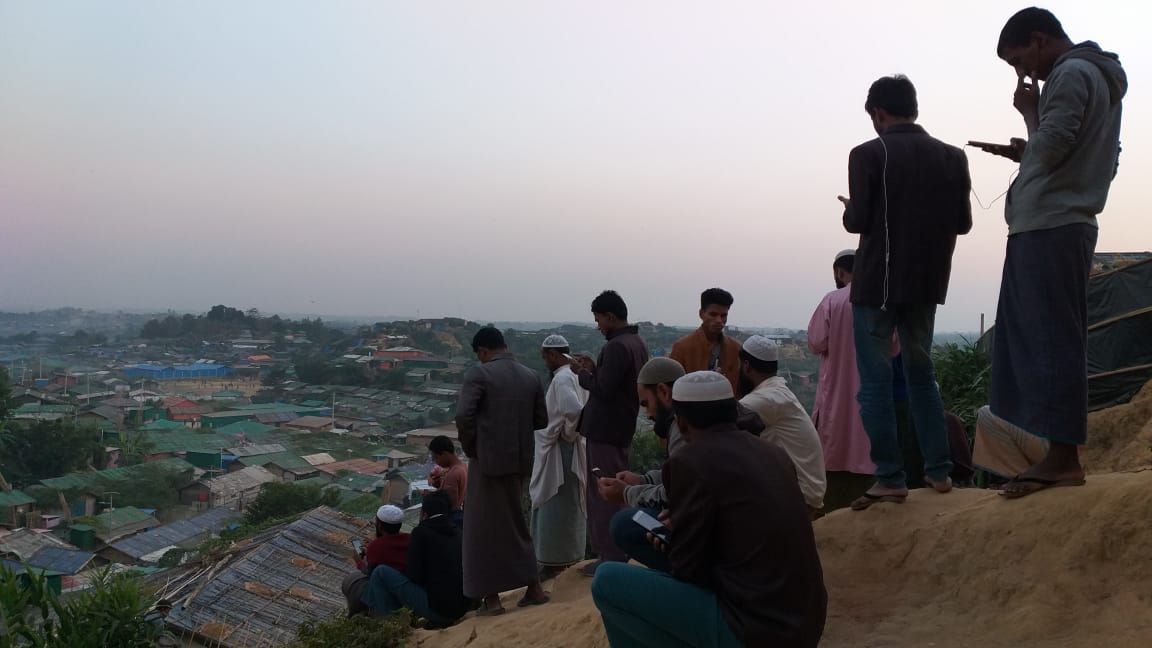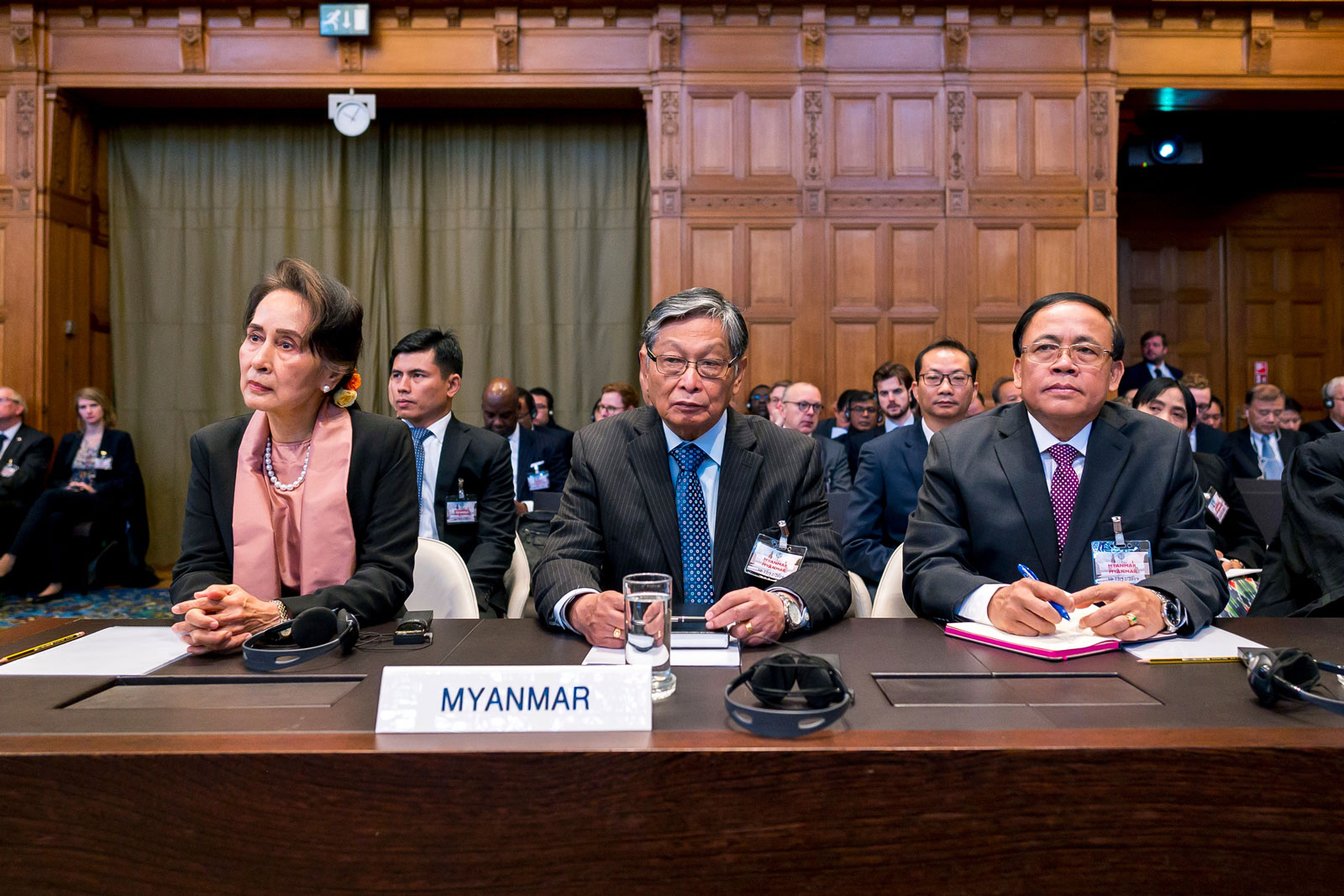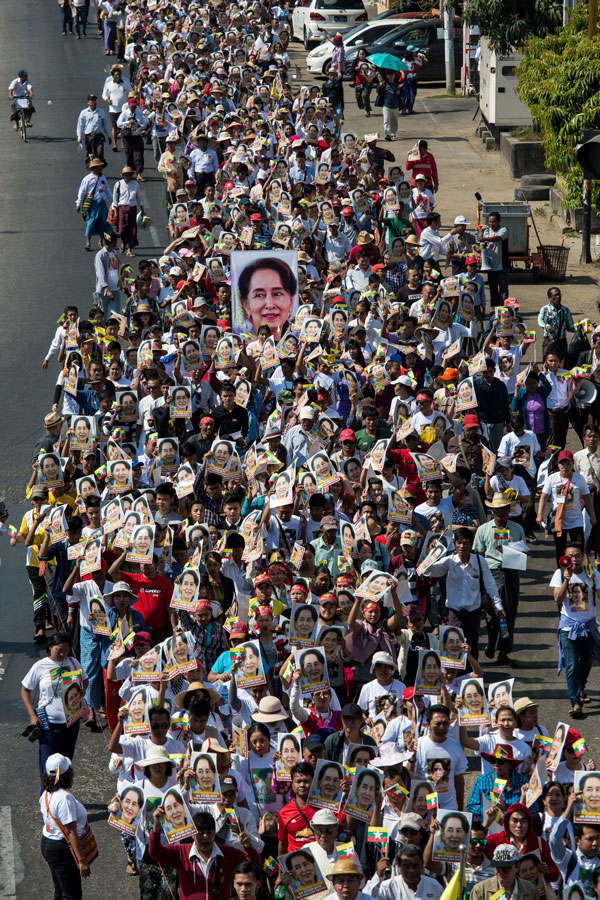As the sun sets over Jamtoli refugee camp in southern Bangladesh’s Cox’s Bazar, several men are still out on a hilltop in search of a phone signal. Some were squatting, others standing, but all were looking down at screens in their hands watching a court case unfolding 7,500km away. They might not be legal experts, but each already had an intimate knowledge of the case.
They were watching Myanmar’s State Counsellor Aung San Suu Kyi defend her country on 11 December at the International Court of Justice (ICJ) from allegations it committed genocide against their people, the Rohingya ethnic group.
In a hearing that began on 10 December, legal experts at the ICJ – based in The Hague, the Netherlands – are deliberating over a landmark case stemming from 2017 “clearance operations” conducted by the Burmese military – also known as the Tatmadaw – targeting the Rohingya in Rakhine State.

Ro Sawyeddolah, a Rohingya youth activist who fled his home in 2017 to Cox’s Bazar, is out on the hilltop for the second night of the hearing. While there’s usually no network access in the camp, he was told the Bangladeshi government was allowing people to access the Internet to watch Suu Kyi and her team rebut the genocide charge.
Network connection was poor, but the men were able to watch from the rutted high ground of the hill. Some had been up there for as long as three hours.
“Everyone is still watching [the ICJ case],” he tells Southeast Asia Globe via telephone in a hushed tone. “Maybe when they’re done, they’ll have their own feelings. Nobody really has an answer.”
The ICJ case was prompted by The Gambia, a tiny, Muslim-majority country in West Africa that sought the backing of the 57-member Organisation of Islamic Cooperation. Almost immediately upon its announcement, the case sparked protests both denouncing and supporting Suu Kyi and her government.
The opening testimony on 10 December from The Gambia’s legal team included a laundry list of atrocities they accuse the Tatmadaw of committing against civilians – including mass killings and the murder of children, mass rape and the systemic burning of homes and businesses.
But still, Burmese home and abroad have pledged their backing for “Daw Suu” at The Hague, with thousands of her supporters rallying in Yangon, the country’s former capital, in recent days to show solidarity with their leader. Proceedings were even streamed on big screens in one Yangon public park.
For some Burmese supporters, it wasn’t enough to just demonstrate in Myanmar. Local travel agencies advertised packages for clients to go to The Hague itself, including flights and hotels for those who wished to visit the ICJ and support Suu Kyi in person.
Europe’s Rohingya activists
Also present in the Netherlands this week are a strong cohort of Rohingya diaspora, a few thousand of whom call Europe home, staging counter-demonstrations. That includes Nay San Lwin, a writer and coordinator for the Free Rohingya Coalition, who now lives in Germany.
San Lwin, who runs Rohingya news site Rohingyablogger.com, said members of his coalition were set to protest outside the Peace Palace, the home of the ICJ, in a show of opposition to the Burmese government. The European Rohingya Council has also organised a protest for the latter days of the hearing, expecting support from non-Rohingya Myanmar Muslim groups, as well as member of the country’s other embattled ethnic minorities.
I don’t know who these people are [supporting the Myanmar government in The Hague] … but what they’re doing is supporting the genocide
Nay San Lwin, Germany-based Rohingya activist
San Lwin, speaking to Southeast Asia Globe in the days leading up to the case, anticipated encountering Burmese pro-government protestors in The Hague.
“I don’t know who these people are [supporting the Myanmar government in The Hague] … but what they’re doing is supporting the genocide,” he said, claiming that Suu Kyi’s attendance would be a major draw for pro-government demonstrators. “This is a grievous crime, and they just know [that] their leader is coming. To them, they believe ‘We have to support our leader.’”
In a move timed with the 9 December commemoration of International Genocide Day, San Lwin, in collaboration with a group of 30 human rights organisations, announced an international boycott of Myanmar. They also petitioned for the Nobel Prize committee to strip Suu Kyi of her 1990 award in light of events since 2017.
The attendance of Suu Kyi as an active head of state at the ICJ is unprecedented in an international court setting. But for San Lwin, it’s a sign of arrogance on the part of both Suu Kyi and her government, both of which he accused of hiding their actions behind hollow rhetoric.
“If [Suu Kyi] comes to court, the case will be solved easily,” he said, suggesting that the government’s usual dismissals of accusations of genocide won’t be so easily accepted at the ICJ.
Maung Zarni, a non-Rohingya Burmese activist who lives in the UK and works with the Free Rohingya Coalition, also said he also believed the testimony from Burmese government figures could be more of a hindrance to their case than a benefit.
“I expect star defender [Suu Kyi], to repeat her lies and denials and dismissals in the face of overwhelming evidence,” he said. “You cannot be any more scientific than the interpretation [of events in Rakhine State] that this is nothing less than a textbook example of genocide.”
Though both San Lwin and Zarni have lived in Europe for more than a decade, they’ve come under fire for their activism. Just recently, they were blasted by Burmese businessman Aye Ne Win – grandson of Myanmar’s former military dictator Ne Win, who ruled from 1962 to 1988 – in a video urging the country’s state intelligence officers to kidnap the two in their new homes and bring them back to Myanmar.
It’s not the first time either of the activists have been threatened, but San Lwin said this time it’s “serious” given the weight behind the message afforded by Ne Win’s status in Myanmar.
“We’ve done all the formal measures here to inform the intelligence community and the police,” San Lwin said, “and in Europe, this kind of thing, this kidnapping, never happens. But his exact message was to silence us, and we’re a bit worried because we live near the Burmese community here who are anti-Rohingya.”

Fallen democracy icon
Suu Kyi rose to international prominence as a political prisoner of Myanmar’s military junta, and was held under house arrest in stretches totalling nearly 15 years before being released permanently in 2010. As a political dissident, she received the Nobel Peace Prize and was promoted by Western leaders as a democracy icon in Myanmar’s repressive political environment.
The landmark electoral victory for her National League for Democracy party in 2015 ushered in an era of optimism. But hopes of an end to the countries many long-running conflicts were quickly dashed as Suu Kyi, who once condemned the violent excesses of the Burmese military, seemed to downplay their actions towards the Rohingya in Rakhine State.
“I’m not saying there are no difficulties,” she told Singaporean broadcaster Channel News Asia in 2016, following reports of a military crackdown in Rakhine State, “but it helps if people can recognise the difficulty and are more focused on resolving these difficulties rather than exaggerating them so that everything seems worse than it is.”
Forming the basis of The Gambia’s ICJ case is the evidence collected by the UN Independent International Fact-Finding Mission on Myanmar (IIFFM), an independent investigative team established by the Human Rights Council in March 2017.
The IIFFM reported “genocidal acts” in Myanmar’s 2017 military actions in Rakhine, that are believed to have killed at least 24,000 people, with some 18,000 women and girls raped.
The violence also forced more than 740,000 Rohingya to flee to relative-safety in Bangladesh, but in September IIFFM Chair Marzuki Darusman stated: “The threat of genocide continues for the remaining [600,000] Rohingya [in Rakhine State].”
Suu Kyi denied this accusation when she took to the stand at the ICJ on 11 December.
Instead, she described violence against the Rohingya as part of a wider history of fighting in a country long divided along ethnic lines. Suu Kyi acknowledged military action against the Arakan Rohingya Salvation Army, a group labelled a terrorist organisation by the government, but denied that civilians had been targeted.
She also referenced government overtures to the Rohingya – such as offers of repatriation, reviews of citizenship status and inclusion in the Myanmar system of higher education – made since 2017 as evidence disproving genocidal intent.
As Suu Kyi closed her remarks with a message of ethnic unity, she called her country’s main legal representative, Willam Schabas, to the podium.
Schabas, a long-time expert of international law and human rights, didn’t directly address the veracity of war crimes allegations made against the Tatmadaw at the ICJ. But he dismissed the charge that a genocide had been committed – as per the definition provided in the UN Genocide Convention and the precedent set with Serbia after the Balkan Wars – arguing that genocidal intent had not been proven to the necessary extent.
He also waved off a set of provisional measures pushed by The Gambia’s legal team – actions that would bar the Tatmadaw from engaging in future violence against or detention of Rohingya civilians, while also preserving evidence of past crimes.
Listening in from the hilltop in Jamtoli camp, far from the polished legal setting of The Hague, activist Sawyeddolah says Suu Kyi’s speech was “not convincing to the Rohingya community, especially about repatriation”.
“I think she is blatantly lying,” he says bluntly.

Digital activism
Though many of the most outspoken Rohingya activists live far from Myanmar, in the world of digital activism, threatening backlash from pro-government forces travels at the speed of light
Carlow, Ireland, is a different world to the fields and forests of Rakhine State, but Haikal Mansor hasn’t forgotten his ancestral homeland. Though the young activist has immersed himself in his adopted country – particularly in its cricket scene, which was revived largely by Rohingya refugees – he’s remained active online.
He regularly shares snippets of information, mostly in the form of poignant memes lambasting Burmese military and civilian leaders. But Mansor’s activism, despite the distance, has still won him the attention of the Burmese government, he tells Southeast Asia Globe in the days leading up the ICJ hearing.
“We who are active on social media receive constant threats, abuses,” Mansor says. “In 2017, I was even threatened by Aung San Suu Kyi’s office and labelled as a ‘Propagandist.’”
His work illustrates the democratising effect of the internet, which has given a voice to this once silenced group. Today, Rohingya refugees can follow the ICJ case even from refugee camps, as well as broadcast the stories of their family and friends who remain in Rakhine State.
Speaking from Kutopalong Camp in Cox’s Bazar, Rohingya activist Mohamed says those still in Rakhine are caught in an unlivable situation. What information that does trickle out on WhatsApp or other messaging services is grim news of continued killings, restricted freedom of movement, and a barrage of heavy weapons fire and explosions in the distance.
But for all the power of the web, he remains frustrated on the night of Suu Kyi’s address at the ICJ. Living in a different camp to Sawyeddolah, with no hill to perch on, the internet connection was so poor he couldn’t stream the hearing and was unaware of what unfolded.
“Everything is limited to the Rohingya,” he says, describing conditions in the camp and blasting the poor communication afforded to the people. “All we get is oxygen.”
With most getting news second-hand from viewers elsewhere, he reaches out from the camp with an outpouring of emotion when he is told that the Myanmar delegation had argued at the ICJ that there was no genocidal intent against the Rohingya.
“We want justice … we Rohingya just want justice,” he says, clearly exacerbated via text message – the signal too poor to maintain a phone call.


